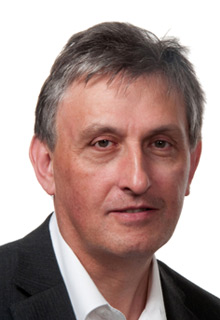Comment / All together now - October 2013
 The autumn is a very busy time in the HFMA presidential year. It has been great having the opportunity to get around the country and meet so many members. Wherever I travel, I find colleagues working hard and squaring up to the same challenges. How do we create value for taxpayers and meet the care needs of our citizens? How do we keep an unrelenting focus on quality and, in fact, drive up outcomes and patient experience? And how do we do this in a difficult financial environment in a way that ensures the long-term sustainability of the NHS?
The autumn is a very busy time in the HFMA presidential year. It has been great having the opportunity to get around the country and meet so many members. Wherever I travel, I find colleagues working hard and squaring up to the same challenges. How do we create value for taxpayers and meet the care needs of our citizens? How do we keep an unrelenting focus on quality and, in fact, drive up outcomes and patient experience? And how do we do this in a difficult financial environment in a way that ensures the long-term sustainability of the NHS?
If this weren’t enough, some colleagues – particularly in commissioning organisations based in England – are coming to terms with new roles and responsibilities, which at any other time would be enough on their own to occupy the day job.
Despite the scale of the challenge, the energy levels at branch conferences have been high. There is undeniably a sense of apprehension, but also optimism and enthusiasm to find solutions.
One thing is clear: our profession is determined to stay united and collegiate. A number of people have commented on the importance of the HFMA in facilitating and reinforcing that sense of community. This role is even more important given that the
NHS architecture is perhaps no longer designed to make that happen.
This cohesion won’t remain in place without work. There are clear roles for the HFMA and for the various organisations in England (such as NHS England, Monitor and the NHS Trust Development Authority) in supporting and developing the NHS finance profession and ensuring the whole continues to be worth more than the sum of its parts.
Discussions with many of our senior leaders encourage me that there is a shared recognition of the importance of this issue. All of this cohesion and strength will be needed as we face up to the
transformation agenda. If you have read any of my columns this year, you will know that I believe the service needs to adapt radically. We need to let go of business models that are no longer fit for purpose.
The opportunity to work with social care is a bold step in the right direction. Working with new partners is never easy, and ultimately relationships need to be based on trust. That trust needs to be enshrined in a shared passion to do the best for our citizens. We need to recognise the need for careful project management, but we won’t be able to – nor should we expect to – cover every eventuality in a contract. No one party will have all the answers, nor carry all the authority.
There will be challenges in taking these courageous steps. But the right solutions are out there. We need to listen to patients, service users and staff – in our own organisations and across the wider health and social care economy. We need to identify the right approaches and then create the right financial models to make them happen in a sustainable way.
As my year of ‘Knowing the business’ draws to a close, I hope we have all learned a little more about the real business of healthcare. And I hope we continue to take opportunities to further enhance this understanding. This knowledge, combined with our professional togetherness, will help us recognise how we could change services for the better, work around the frustrations of the current system, and move on to a better solution.
Contact [email protected] or Twitter: @tonywhitfield2
Related content
We are excited to bring you a fun packed Eastern Branch Conference in 2025 over three days.
This event is for those that will benefit from an overview of costing in the NHS or those new to costing and will cover why we cost and the processes.